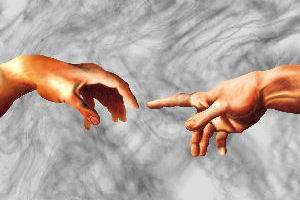The devolution of legislators
 This month in Incredibly Stupid, Conservative MPP Rick Nicholls, who represents the riding of Chatham-Kent-Essex, was kind enough to edify the legislature of two incontrovertible facts: first, that he's a moron, and second, that he's not shy to demonstrate it. Responding to criticism on the government's recent sex-education curriculum, Education Minister Sandals was quick to sally that the Tories would "opt out of teaching about evolution too". Nicholls, in an unabashed effort to demonstrate that common sense should never be a deterrent, was quick to respond that the exorcism of evolution "was not a bad idea". Not surprisingly, Nicholls' stupendous comments were met by howls and jeers from the Liberal and N.D.P. benches. The Windsor Star reported that Nicholls comments "even raised eyebrows among the Conservatives". Of course it's easy to understand why his comments only managed to raise the eyebrows of his Conservative comrades: being lower order mammals that haven't quite mastered jeers and howls, they've got to rely on lower order functions, like raising eyebrow [singular noun intended], to communicate. Responding to reporters outside the legislature, Nicholls posited his earlier comment, asserting "For myself, I don't believe in evolution".
This month in Incredibly Stupid, Conservative MPP Rick Nicholls, who represents the riding of Chatham-Kent-Essex, was kind enough to edify the legislature of two incontrovertible facts: first, that he's a moron, and second, that he's not shy to demonstrate it. Responding to criticism on the government's recent sex-education curriculum, Education Minister Sandals was quick to sally that the Tories would "opt out of teaching about evolution too". Nicholls, in an unabashed effort to demonstrate that common sense should never be a deterrent, was quick to respond that the exorcism of evolution "was not a bad idea". Not surprisingly, Nicholls' stupendous comments were met by howls and jeers from the Liberal and N.D.P. benches. The Windsor Star reported that Nicholls comments "even raised eyebrows among the Conservatives". Of course it's easy to understand why his comments only managed to raise the eyebrows of his Conservative comrades: being lower order mammals that haven't quite mastered jeers and howls, they've got to rely on lower order functions, like raising eyebrow [singular noun intended], to communicate. Responding to reporters outside the legislature, Nicholls posited his earlier comment, asserting "For myself, I don't believe in evolution".
I happen to subscribe to the notion that the belief systems of our elected representatives, at least to some degree, mirror those found in the broader social milieu. I also happen to subscribe to the philosophy that what individuals believe, insofar as it pertains to their private sphere, is at the core of human dignity and autonomy. The fact that Rick Nicholls doesn't believe in evolution is, in itself, innocuous. It is a view which may well be shared by fellow Conservative James Lunney, a federal MP from British Columbia, who appeared to advocate in Nicholls' defence tweeting "stop calling #evolution fact!". So there's no doubt on my position, it is not Rick Nicholls' rejection of evolution which makes him a moron. What makes Nicholls a moron is his belief that evolution, as a sound and compelling theory on the origin of the species, should not be taught in the public sphere. I find it interesting that Nicholls' office, though I have made an official request, is yet to offer an alternative explanation for the origins of our species. Though I am open to any explanation Rick may offer, until such time as a response is received, I can only presume that his explanation will have an ontological basis in religious dogma.
I'm willing to bet half my stuffed armadillo collection and two bottles of Wild Turkey that Rick advocates the teaching of creationism, in one form or another, as an alternative to evolution. And, since I prefer hedging my bets on a balance of probabilities, I'd venture a guess that Rick's explanation corresponds to those views held by the most popular religions in our society: Judaism and Christianity, both of which rely on the Genesis narrative as the foundation for human existence. As I suspect most readers will be somewhat familiar with the discourse, I'll summarize the narrative succinctly: God (Yahweh) created man from dust, woman from one of man's ribs and then a talking snake entered the picture and counselled the two innocents to shoplift fruit from God's general store.
At the risk of suggesting Nicholls is a doctrinaire, ethnocentric git, I can't help but wonder what his thoughts might be on teaching the Kumulipo, an ancient Hawaiian chant which tells the story of creation. The ancient Hawaiain kahunas (priests) would recite the Kumulipo during makahiki (New Year festival) to honour Lono. Comprised of sixteen wa (ages or era), the Kumulipo outlines how the world was created over the ages with each wa paying homage to an individual era. In the first wa, seaweed and urchins emerge. In the second wa, fish emerge and by the third wa, several types of flying creatures appear. As the chant progresses, humans emerge by the ninth wa and much of the remaining Kumulipo is dedicated to family lineage.
Only the casual observer might notice the uncanny evolutionary theme developed through the progression of Kumulipo wa: the emergence of plant life in water, aquatic creatures, various flying creatures and, eventually, our species in a much later time. As a consequence, I suspect Rick Nicholls would dismiss the Kumulipo as primitive native hodge-podge faster than Joe Fontana could reach for a bottle of white-out. Mercifully, I find myself more charitable than Nicholls in what I view as appropriate for the public school curriculum. Not only do I think evolution should form a part of the curriculum, but I'd also advance the inclusion of creationism as well. This, of course, might trouble Nicholls because such inclusion would not be limited to the xenophobic approach of advancing a single ontological philosophy. Evolution, I would argue, is as deserving as scrutiny as are all beliefs of creation. What, pray tell, could possibly be wrong with asking our youth to consider the implications of Russell's teapot?
 In light of Nicholls' recent brainfart, I found myself, through a method of intellectual inquiry, searching for a rationale which ight serve to bolster Rick's position and probable view on the origin of our species. (Since he's not extended the courtesy of responding to my email inquiry, I am forced to intuit what his probable position might be.) It seems the best I could muster is an argument for Original Joke. It's quite similar to the notion of original sin in that it sustains the Genesis narrative and takes place in the Garden of Eden but it differs slightly. Accordingly, Original Joke opines that the etymology of humour is of divine origin. Need proof? Okay, look at the picture. Is it just me, or does this just scream: "Okay Adam... pull my finger!"?
In light of Nicholls' recent brainfart, I found myself, through a method of intellectual inquiry, searching for a rationale which ight serve to bolster Rick's position and probable view on the origin of our species. (Since he's not extended the courtesy of responding to my email inquiry, I am forced to intuit what his probable position might be.) It seems the best I could muster is an argument for Original Joke. It's quite similar to the notion of original sin in that it sustains the Genesis narrative and takes place in the Garden of Eden but it differs slightly. Accordingly, Original Joke opines that the etymology of humour is of divine origin. Need proof? Okay, look at the picture. Is it just me, or does this just scream: "Okay Adam... pull my finger!"?
Submitted by Norm de Plume, 28 February 2015